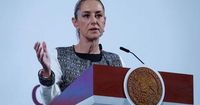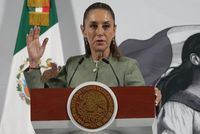On Friday, April 4, 2025, President Claudia Sheinbaum led her morning press conference at the National Palace, focusing on initiatives to strengthen the Mexican countryside and achieve food sovereignty and self-sufficiency. The conference, known as "La Mañanera del Pueblo," highlighted a comprehensive agricultural plan that includes investments exceeding 50 billion pesos and a new support program for producers.
The Secretary of Agriculture and Rural Development, Julio Berdegué Sacristán, outlined ambitious goals for the plan, which aims to significantly increase the national production of essential foods. The targets include raising corn production from 21 to 25 million tons (a 17% increase), beans from 730,000 to 1.2 million tons (a 100% increase), rice from 221,000 to 450,000 tons (more than double), and milk from 13 billion to 15 billion liters. To support this initiative, LINCONSA, which will soon be renamed Leche para el Bienestar, plans to increase its purchase of national milk by 89%, growing from 687 million to 1.3 billion liters.
In a significant move, the federal government launched the "Cosechando Soberanía" program, aimed at providing comprehensive support to over 300,000 small and medium-sized producers across the country. This initiative will prioritize planting in southern and southeastern regions such as Campeche, Chiapas, Veracruz, Oaxaca, Guerrero, Yucatán, and Morelos, where water availability is more favorable. The program includes various forms of assistance, such as credits with insurance, technical agroecological support, animal health research, the distribution of high-quality seeds, and marketing support with added value.
Sheinbaum also announced plans for the establishment of 30,000 Tiendas del Bienestar by 2030, which will offer basic food baskets at prices below market rates. These stores will cover all municipalities in the country and prioritize products from small and medium national producers, including staples like corn, beans, coffee, cocoa, and honey. The initiative aims to promote the consumption of nutritionally rich foods while ensuring fair prices for producers.
Looking ahead, the government projects that by 2030, the Leche para el Bienestar program will distribute 1.2 billion liters of milk annually, benefiting 10 million people—60% of whom will be women—through 20,000 distribution points nationwide, with a total investment in the sector reaching 17.5 billion pesos.
During the conference, Sheinbaum addressed ongoing investigations into various political figures, including Cuauhtémoc Blanco and Alejandro Moreno, stating that these matters fall under the jurisdiction of the ministerial authorities. "It corresponds to the prosecutors; it is not a political issue. In all cases, there should be no impunity," she emphasized.
Regarding a homicide case in Chalco, State of Mexico, involving an elderly woman named "Carlota," who allegedly killed two men attempting to invade her property, Sheinbaum noted that investigations are ongoing and that she would comment further once more information becomes available.
In light of corruption allegations, Sheinbaum confirmed the closure of SEGALMEX, stating that the Prosecutor's Office would continue the investigations. She clarified that DICONSA and LICONSA have been administratively separated from SEGALMEX.
On financial matters, Sheinbaum highlighted that the Financiera para el Bienestar will continue to provide loans and coordinate support for artisans, while the Banco del Bienestar does not offer loans but may share services.
She also defended the benefits of the USMCA (United States-Mexico-Canada Agreement), asserting that most Mexican products can be exported without tariffs, with exceptions for the automotive, steel, and aluminum sectors. "What was achieved in Mexico is that, for all products except automotive, steel, and aluminum, there are zero tariffs if exported through the USMCA," she stated.
On the automotive front, Sheinbaum noted that Stellantis is evaluating whether to continue electric vehicle production in Mexico due to current tariff conditions, though she assured that there are no plans for job reductions. In contrast, Volvo and Nissan are set to increase production at their plants, reflecting confidence in the Mexican market.
Sheinbaum confirmed her participation in the CELAC (Community of Latin American and Caribbean States) meeting in Honduras on April 9, where President Xiomara Castro will hand over the presidency to Colombian President Gustavo Petro. She will travel via a Defense aircraft.
Looking ahead to the weekend, the president announced a tour of three locations: the "El Insurgente" cable-stayed bridge, a Health Center in the State of Mexico, and an official visit to Michoacán. Additionally, she will participate in the National Boxing Class in the Zócalo of Mexico City, where she will signal the start of the event, although she clarified that she will not be boxing herself.
Sheinbaum's press conference covered various topics, including ongoing dialogues with nixtamaleros to facilitate direct connections between producers and tortillerías, as well as her criticism of a judge's decision to allow a suspension preventing children from consuming junk food in schools. She urged parents to provide healthier options for their children, emphasizing that judges should prioritize health over such suspensions.
In response to criticism regarding the sugar content in Chocolate para el Bienestar, she noted that it contains less sugar compared to commercial chocolates but must still comply with labeling regulations.
As the conference concluded, Sheinbaum's administration reaffirmed its commitment to enhancing food security, supporting local producers, and addressing corruption, all while navigating the complexities of international trade agreements and domestic policies.



